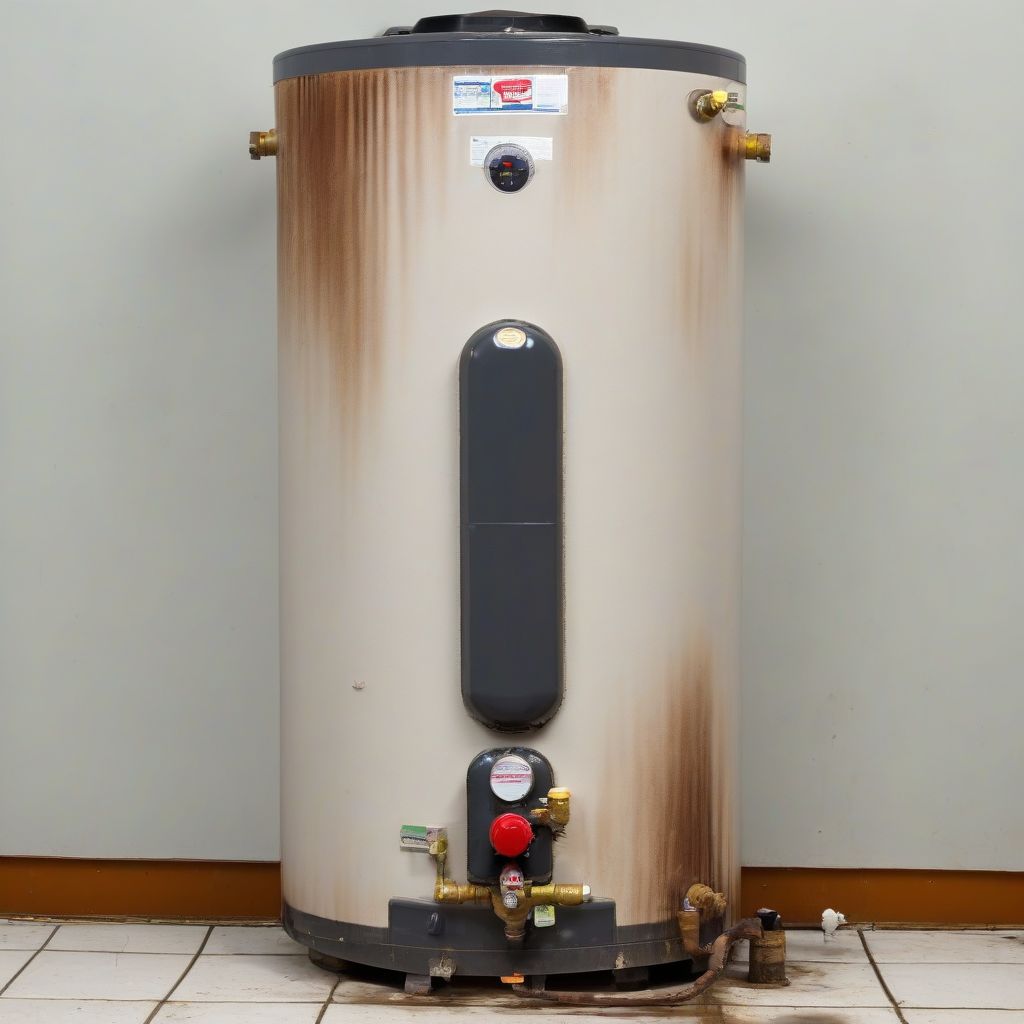Gas Water Heater Leaking From Bottom: A Potential Plumbing Emergency
Imagine this: you walk into your basement and are greeted by a puddle of water forming around your gas water heater. That, my friend, is a sign of a leak, and it’s not something to ignore. A gas water heater leaking from the bottom can signal a serious problem requiring immediate attention. This article delves into the common causes, potential dangers, and solutions for this plumbing predicament.
Understanding the Risks: Why a Leaky Gas Water Heater is a Big Deal
A gas water heater, while providing the luxury of hot showers and readily available hot water, can pose serious risks if not functioning properly. A leak from the bottom is particularly concerning and should never be taken lightly. Here’s why:
- Water Damage: The most immediate concern is the water itself. A leak, even a seemingly small one, can quickly escalate, leading to significant water damage to your flooring, walls, and surrounding belongings.
- Corrosion and Rust: Prolonged exposure to water can cause rust and corrosion of the water heater’s metal components, eventually leading to premature failure.
- Gas Leaks: While not always the case, a water leak from the bottom could indicate a problem with the gas lines or connections. Gas leaks are incredibly dangerous due to their flammable nature and potential health risks.
Common Culprits: Identifying the Source of the Leak
Pinpointing the exact cause of a gas water heater leak is crucial for effective repair. Several components can be the culprit:
1. Drain Valve
Could it be?: The drain valve, located at the bottom of the tank, is often the easiest culprit to identify and fix. A loose connection or a worn-out washer can lead to leaks.
How to Check: Inspect the drain valve for any visible signs of dripping water. Try tightening the valve slightly; however, avoid over-tightening, as this could worsen the problem.
2. Temperature and Pressure Relief Valve (T&P Valve)
Could it be?: This valve, usually located on the side of the tank, acts as a safety mechanism, releasing excess pressure or temperature buildup. A malfunctioning T&P valve can discharge water, often from a discharge tube that leads to the floor.
How to Check: A leaking T&P valve often releases water in spurts, especially when the water heater is heating. Check if the discharge tube is wet or if water is dripping from the valve itself.
3. Internal Tank Corrosion
Could it be?: Over time, the steel tank of a water heater can corrode from the inside out, eventually leading to leaks. This is more common in older units.
How to Check: Unfortunately, internal tank corrosion is not easily detectable without a professional inspection. If your water heater is old (over 10 years) and leaking, this is a strong possibility.
4. Loose Water Connections
Could it be?: Loose connections at the inlet or outlet pipes of the water heater can also cause leaks.
How to Check: Carefully examine the connections where the pipes enter and exit the water heater. Look for any signs of dripping or water stains that indicate a loose connection.
gas.areview.net/wp-content/uploads/2024/09/leaking-gas-water-heater-66dfee.jpg" alt="Leaking Gas Water Heater" width="1024" height="1024">Leaking Gas Water Heater
Troubleshooting and Repair: Taking Action
While some minor leaks, such as a loose drain valve, can be addressed with basic DIY skills, it’s generally recommended to call a licensed plumber, especially if you suspect a more serious problem or are uncomfortable working with gas appliances.
Here’s what a professional plumber will likely do:
- Turn off the Gas and Water Supply: As a safety precaution, the plumber will shut off both the gas and water supply lines to the water heater.
- Diagnose the Problem: They will thoroughly inspect the unit, including the components mentioned earlier, to pinpoint the exact source of the leak.
- Provide Repair Options: Depending on the severity and cause of the leak, the plumber will recommend either repair or replacement of the water heater or specific components.
Prevention is Key: Extending the Lifespan of Your Water Heater
Taking proactive steps can help prevent leaks and prolong the lifespan of your gas water heater:
- Regular Maintenance: Schedule annual maintenance checks with a qualified plumber to inspect and flush the tank, check the anode rod, and test the pressure relief valve.
- Monitor the Anode Rod: The anode rod is a sacrificial metal rod that attracts corrosive elements in the water, protecting the tank. Regularly inspecting and replacing the anode rod can significantly extend the tank’s life.
- Address Leaks Promptly: Never ignore even minor leaks. Addressing them early can prevent more significant problems and costly repairs down the line.
In Conclusion: Safety and Expertise Matter
A gas water heater leaking from the bottom is a plumbing issue that demands immediate attention. Understanding the potential risks, common causes, and importance of professional assistance is crucial for ensuring your safety and the integrity of your home. Regular maintenance and prompt attention to any leaks can help keep your hot water flowing safely and efficiently for years to come.
